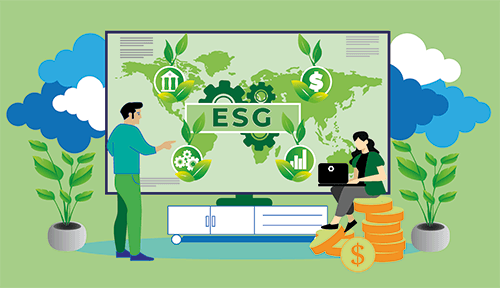The dynamics of connecting ESG to value creation
Attributing the amount of value contributed by strong Environmental, Social and Governance (ESG) scores to the enterprise value of a business is a complex issue. It is necessary to look at what is being measured and improved and the impact this has on both financial and non-financial results and considering the expectations of all stakeholders.
Taking a fresh approach
Historically the main value drivers have been focused on increasing revenue and reducing costs. Whilst the fundamentals do not change, in the new world of sustainable investments, there is increased focus on ensuring that revenue and cost is managed in a way that has a positive impact on a wider set of stakeholders.
For example, improving employee satisfaction can reduce staff turnover, this in turn, cuts recruitment costs and improves customer satisfaction which decreases churn and increases referrals. Put simply revenue and EBIT is improved through a more indirect (and longer term) approach with the added benefit of stronger employee and customer satisfaction. It’s a win, win for all stakeholders.
When considering energy and water consumption or CO2 and waste production, there will usually be a correlation between the action being taken and a financial measure. It’s just much more complex to track.
Driving Value in today’s competitive landscape requires a fresh approach
Even before the disruption caused by Covid-19, Private Equity firms faced increased regulatory and investor pressure. Many PE firms have completed ESG reviews across the portfolio and have formal ESG policies in place. The challenge these firms face is to industrialise their processes to enable a continuous cycle of measurement, benchmarking, and improvements across the portfolio.
It’s also important to consider the wider impact of data and systems, according to PwC, and to provide a level of insight that incorporates Financial, Operational, ESG and value creation. Driving value in today’s competitive landscape requires a fresh approach.
Further reading: The new role of Data in Private Equity
How does ESG create value?
According to a PRI report “there is clear evidence that engagement by investors with companies on environmental, social and governance (ESG) issues can create shareholder value. But, despite the growth in engagement activity by investors, exactly how ESG engagement creates value is poorly understood” .
Within private equity and venture capital, ESG has been one of the main emerging factors in value calculation. We wrote recently about ways that Portfolio Managers are starting to embed ESG in their value creation planning and how some, such as Helen Fagraeus Lundstrom, Head of Via Summa, Summa Equity hold a view that “aligning [United Nations] Sustainable Development Goals (SDGs) with corporate objectives when searching for investment opportunities increases returns and reduces risk".
According to McKinsey “For executives and investors alike, understanding the links between ESG and business value is essential to making sound decisions about how to allocate capital and other resources.”
“Aligning [United Nations] Sustainable Development Goals (SDGs) with corporate objectives when searching for investment opportunities increases returns and reduces risk"
Further reading: How to embed ESG into your value creation planning
The link between ESG and value creation
According to a Deloitte report “ESG impacts are generally longer-term in nature and, in many cases, beyond the direct control of a company. This makes the linkage of ESG impacts to business value even more challenging”.
Firms in the private equity industry are already seeing success through the recognition and application of ESG.
Founded in 2007, Ambienta is one of the largest and most experienced sustainability investors. Their investment strategy is borne out of a belief that investing in sustainability-driven businesses delivers both financial returns and measurable environmental impact.
Ambienta has developed an internationally-recognised ESG integration programme in its operations and culture. The programme systematically integrates ESG management guidelines and practices into day-to-day operations at both General Partner and portfolio company-level.
Yet despite these positive moves towards more sustainable investment strategies, there are still gaps in the market. LCP’s annual Responsible Investment survey concluded that "nearly a third of investment managers are not committed to systematically considering environmental, social and governance (ESG) factors as part of their investment process, across all asset classes".
The main factors for this reluctance include a lack of consistency of sources, quality and reliability of data and disparate ways of measuring and reporting - with funds currently using data from rating agencies and third parties to develop their own ESG valuation frameworks which are left open to interpretation.
"ESG measures - including decarbonisation - could be embedded into the powerful and sophisticated value creation plans that PE already has"
The challenge remains on how to overcome the complexity of connecting ESG to value creation with a report by PwC suggesting “that ESG measures—including decarbonisation—could be embedded into the powerful and sophisticated value creation plans that PE already has”.
Further reading: ESG impact on post-covid value creation planning
What are the benefits of connecting ESG to value creation?
Increase attraction of investors
There are many sources of reference to bolster this statement.
According to Harvard Business Review "Companies don’t win over investors just by issuing sustainability reports and engaging in other standard ESG practices”. Instead they need to integrate ESG into strategy and operations and embed it into their value creation.”
Further, according to PwC “PE’s edge has always been to create value by driving transformation more quickly and deeply than other owners can. However, expectations are rising rapidly that stewards of capital—be they CEOs of companies or PE firms—play a more active and constructive role on a range of environmental, social and governance (ESG) issues, especially those related to decarbonisation”.
With SP Global offering further evidence that companies who don’t focus on ESG risk impacting their long-term competitiveness.
“Research is increasingly showing that companies which do not integrate environmental, social and governance (ESG) factors into their business strategy put their long-term competitiveness at risk"
Gain more market share
CVC Capitals five levers of the 'value fundamentals' really resonates with EXM's mission to support businesses by helping them make sense of their sustainability data and track the ESG metrics within their value creation plan.
According to CVC Capital “the five levers of the ‘value fundamentals’: workplace, community, marketplace, environment and governance will make a difference in the long term by improving the ‘value fundamentals’ of the company through sustainable and responsible value creation”
Improve returns
As far back as 2019 HBR highlighted a 2017 study by Nordea Equity Research (the largest financial services group in the Nordic region) that reported from 2012 to 2015, the companies with the highest ESG ratings outperformed the lowest-rated firms by as much as 40%.
"ESG elements are important strategic components that drive financial results and that prioritising sustainability and decarbonisation generate superior long-term financial performance".
Fast forward to 2021 and the evidence is even stronger. According to a Forbes article "ESG elements are important strategic components that drive financial results and that prioritising sustainability and decarbonisation generate superior long-term financial performance".
New definitions of value
New definitions of value are gaining ground. Does value have to be perceived as purely financial value? A recent article by PRI gives a new dimension to ESG value calculation by including the communication, learning and political values of ESG engagement and states “we regard [ESG] engagement as being worth more than its pure financial returns, and we adopt a broad definition of value that recognises a variety of benefits of engagement beyond financial performance alone.”
Stuart Keeler, UNTAP by EXM's Chief Growth Officer adds "The question is no longer “if” but “how” active engagement around ESG drives value and whilst it may be difficult to directly quantify the contribution of the individual parts, the collective effort and focus to excel should result in a firms products or services having more longevity".
"The question is no longer “if” but “how” active engagement around ESG drives value"
ESG is a disrupter and it will be interesting to look at the research in the coming years which compares and contrasts the results of firms that are leading and lagging on the ESG front. The expectation is that firms that truly embrace ESG as an opportunity to differentiate themselves and their products are going to be more successful which in turn will preserve or improve valuations.
Conclusion
ESG and sustainability is here to stay.
From the mountain of evidence, it's clear that when companies incorporate ESG into their long-term investment strategy and embed it firmly in their value creation planning they can increase their financial returns, mitigate risks and, develop greater resilience.
However, transforming into an ESG leader takes time, and to achieve the sustainability goals and be a good world citizen, companies need to think holistically across the entire value creation process.
If you enjoyed this article and would like to read more please visit our blog
/LOGO_WHITE_2022.png?width=3357&height=959&name=LOGO_WHITE_2022.png)
/LOGO_BLACK_2022.png?width=1000&height=286&name=LOGO_BLACK_2022.png)


